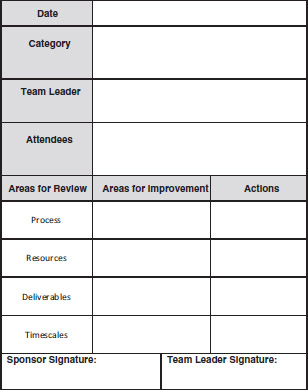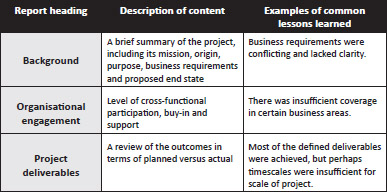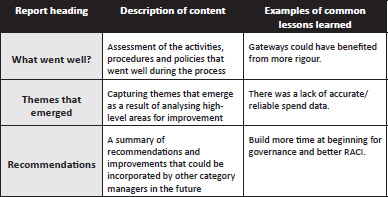Activity 33
Post-Project review
Overview
A Post-Project review (PPR) is considered ‘best practice’ and is often accompanied by a ‘lessons learned’ document. Both can help those involved with the category management process reflect upon performance and improve where possible. This learning can be shared more widely across the function/organisation so that, over time, overall category management capability and performance is increased.
The Association for Project Management advocates that a PPR is held after the handover of project deliverables and is a way of signalling an end to the programme of activities. It is also an opportunity for organisations to measure the effectiveness of their activities. This presents a challenge for ‘true’ category management, which should be seen as an ongoing, iterative process rather than a one-off project. Thus, for practical purposes, we recommend a PPR be conducted at the end of each category management process cycle.
Elements
Success tends to be measured in terms of the following:
- Project delivery – Were requirements delivered on time, on target and within scope?
- Client satisfaction – Were team members and other stakeholders satisfied?
- Benefits realisation – Did the category actually deliver the organisational benefits proposed?
In order to fully evaluate the project, the category team should come together to develop a report from which analysis can be drawn and success determined. A PPR template which incorporates a ‘lessons learned’ section so that participants can reflect upon performance can be used to provide structure for the review debate, as illustrated in Figure 5.13.
So what?
The PPR acts as a final milestone in the process, and much can be gleaned from the lessons learned. If undertaken correctly, it can help others to avoid bad practice and pitfalls and can also support capability development across the organisation. For a PPR to be effective, participants need to be open about what didn’t work, as well as shine a light on areas of success; otherwise only cursory progress will be made.
It should be noted that a Post-Project review is different to a ‘gateway review’, the latter taking place periodically in order to evaluate ongoing progress at key stages of the category management process, while the former is a one-off, single event that draws the process to a close. Best practice suggests that lessons learned be recorded as they occur during the category management process and then reviewed as part of the PPR activity, rather than held until the end of a three- to six-month process for team members to reflect on past events.
Category management application
- Provides an overview of effectiveness
- Supports a culture of organisational learning and continuous improvement
- Highlights successes and failures
- Enables development of others through ‘lessons learned’
- Provides a means of self-reflection and personal development
Limitations
PPR can become a poorly executed activity for the following reasons:
- It can be difficult to maintain momentum so near the completion of the category process. As a consequence, team engagement in a review can be half-hearted.
- The quality of information extracted from the PPR relies upon the ability to draw out information that others may not want to be made public, for example errors/omissions and suboptimal practice. It is imperative that the team elects the most suitable individual for this difficult role. Good facilitation skills are essential, and it is not the case that the category manager automatically takes on this responsibility; it needs to be an independent, neutral party.
Opinion is divided amongst category management authors regarding whether to include this closure activity within the overall process. Some suggest the PPR is a necessity, while others make no mention of it at all, and therefore this lack of consistency has led to uncertainty amongst practitioners. In contrast, the ‘lessons learned’ concept is widely acknowledged as an important element of category management.
Another consideration is that of knowledge management and organisational learning. There is little point in undertaking the PPR activity if there is no capacity within organisational infrastructure or culture to learn from the output. It’s a sobering point, but if your organisation has zero capacity to learn, then don’t bother wasting your time on PPR.
Template
The following template may be used to assist with the Post-Project review:
- Template 33: Post-Project review


